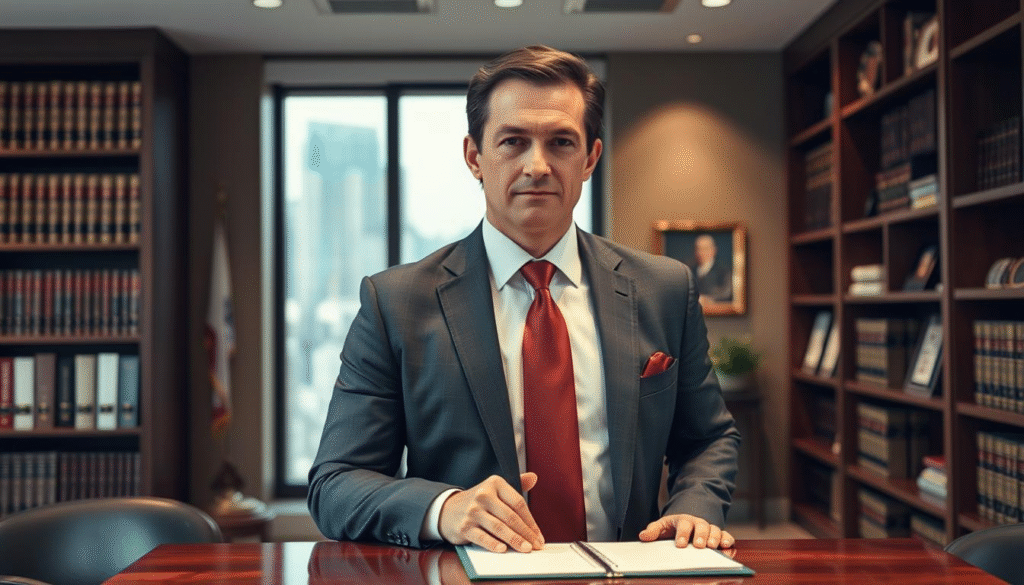Did you know that having a legal representation can change your case’s outcome? Many people who try to handle their cases themselves lose because they don’t know the law.
Choosing a top-rated civil litigation expert can make all the difference. They know the legal system well and can protect your rights. They make sure your interests are looked after.

With the right legal representation, you can increase your chances of winning. This article will help you find a top-rated civil plaintiff lawyer. You’ll learn how to make a smart choice.
Key Takeaways
- Understand the importance of hiring a skilled civil litigation attorney.
- Learn how to identify a top-rated civil plaintiff lawyer.
- Discover the benefits of professional legal representation.
- Gain insights into the civil litigation process.
- Find out how to prepare for your case with the right legal expert.
What Civil Plaintiff Lawyers Do
Civil plaintiff lawyers help people or businesses get back what they lost. They are experts in handling different civil disputes.
The Role and Responsibilities of Civil Litigation Attorneys
Civil litigation attorneys check if a case is strong, write legal papers, and speak for clients in court. They focus on strategic case building and collecting evidence to support their clients.
They work with clients to understand their problems, collect important info, and create a legal plan that fits their needs.
Types of Cases Handled by Civil Plaintiff Lawyers
Civil plaintiff lawyers deal with many types of cases, including:
Personal Injury Claims
Contract Disputes
Property Damage Cases
Personal Injury Claims
A personal injury attorney helps those hurt by others’ carelessness. They fight for money for medical bills, lost work, and pain.
Contract Disputes
In contract disputes, a litigation specialist helps clients with disagreements over contracts. They try to solve these issues through talking or going to court.
Property Damage Cases
A compensation claim lawyer helps those whose property was damaged by others. They guide clients through the claim process to get fair compensation.
When You Need to Hire a Civil Plaintiff Lawyer
Thinking about legal action? It’s key to know when you need a civil plaintiff lawyer. Civil cases can be tricky. The right lawyer can greatly impact your case’s success.
Recognizing Situations That Require Legal Representation
You might need a civil litigation expert for personal injury, contract breaches, or work disputes. These cases need a trial attorney to handle the legal steps well.
Critical Timing Considerations for Maximum Legal Protection
Timing is everything in civil cases. Waiting too long can mean missing deadlines, losing evidence, or even losing your case. A civil plaintiff lawyer can guide you on when to act to avoid these issues.
Potential Consequences of Delayed Legal Action
Not acting quickly can lead to big problems, like:
- Loss of key evidence
- Missing deadlines
- Lower chances of winning
Getting a civil plaintiff lawyer early can help avoid these issues and ensure your case is managed well.
Benefits of Hiring a Specialized Civil Plaintiff Lawyer
Choosing a specialized civil plaintiff lawyer can greatly change your case’s outcome. They have a lot of knowledge and experience. This means your rights are well-protected and your interests are looked after.
Expert Navigation of Complex Legal Procedures
A civil plaintiff lawyer knows all about civil litigation. They can handle complex legal steps with no problem. This skill helps avoid delays and makes sure your case is strong.
Strategic Case Building and Evidence Collection
With a litigation specialist, you get their expert approach to building your case. They know which evidence is key and how to show it. This strengthens your case for negotiations or court.
Key benefits include:
- Enhanced credibility in court
- Improved chances of maximizing compensation
- Expert handling of complex legal procedures
Maximizing Your Compensation
A compensation claim lawyer knows how to find the full value of your claim. They work hard to make sure you get the most compensation you deserve.
Essential Qualifications in a Top-Rated Civil Plaintiff Lawyer
When looking for a top civil plaintiff lawyer, their qualifications matter a lot. A legal advocate with the right skills can greatly help your case.
Education and Certification Requirements
A good civil plaintiff lawyer has a law degree from a recognized school. They must also be licensed to practice in their state. They might also have special certifications in civil litigation, showing their deep knowledge in this field.
Relevant Experience with Similar Cases
Experience is vital in civil litigation. Choose a trial attorney who has dealt with cases like yours. They’ll know the laws and procedures well.
Proven Track Record of Successful Settlements and Verdicts
A civil litigation expert should have a history of winning cases. Look at their settlement success rates and trial wins.
Settlement Success Rates
A high settlement success rate shows the lawyer is good at getting good deals for clients.
Trial Experience and Outcomes
A lawyer with lots of trial experience can handle complex cases well. They’re more likely to get good results.

By looking at these key qualifications, you can find a top civil plaintiff lawyer. They’ll be ready to tackle your case.
How to Research and Find a Civil Plaintiff Lawyer
Looking for a civil plaintiff lawyer? It’s key to do your homework. You want someone who can really help you. A good lawyer can make a big difference in your case.
Utilizing Online Legal Directories and Resources
Online legal directories are great for finding lawyers. Sites like Avvo, Martindale-Hubbell, and FindLaw have lots of info. They show a lawyer’s experience, what clients say, and what they specialize in. This helps you find litigation specialists who know their stuff.
Checking Bar Association Records and Disciplinary History
Make sure to check a lawyer’s credentials through bar association records. Looking at their disciplinary history can tell you if they’ve had any issues. This helps you pick a personal injury attorney you can trust.
Analyzing Client Reviews and Testimonials
Client feedback is very telling. It shows how well a lawyer communicates and how successful they are. Reading these reviews helps you see if they’re a good fit for you.
Getting Referrals from Trusted Sources
Ask people you trust for lawyer recommendations. Friends, family, or coworkers can give you real insights. They can tell you about a lawyer’s skills and work ethic.
| Research Method | Description | Benefits |
| Online Directories | Use websites like Avvo and Martindale-Hubbell | Detailed attorney profiles, client reviews |
| Bar Association Records | Check disciplinary history | Verify credentials, ensure reputation |
| Client Reviews | Analyze testimonials | Insights into professionalism, success rate |
| Referrals | Get recommendations from trusted sources | Firsthand information about a lawyer’s capabilities |
Critical Questions to Ask During Your Initial Consultation
When you meet a civil plaintiff lawyer for the first time, it’s important to ask the right questions. This meeting helps you see if the lawyer is a good fit for your case. You can check their expertise, how they work, and if they understand what you need.
Case Assessment and Strategy Questions
To know how a lawyer will handle your case, ask about their view of your claim’s strengths and weaknesses. Find out their plan for building a strong case and how they will get the evidence needed.
- What is your evaluation of my case’s chances of success?
- How will you collect evidence to support my claim?
Fee Structure and Payment Arrangement Questions
It’s important to understand how the lawyer will be paid. Ask if they work on a contingency fee basis and what percentage they take. Also, ask about any extra costs that might come up during the case.
- Do you work on a contingency fee basis, and if so, what percentage do you charge?
- Are there any additional costs or expenses I should be prepared for?

Communication Protocol and Case Management Questions
Good communication is key to a successful relationship with your lawyer. Ask how they plan to keep you updated on your case and how to reach them with questions or concerns.
- How will you communicate with me throughout my case?
- Who will be my main contact in your office?
Timeline and Possible Outcome Questions
It’s important to know the timeline and possible outcomes of your case. Ask about how long your case might take and the possible results, like a settlement or trial.
- What is the expected timeline for solving my case?
- What are the possible outcomes of my case, and how will you aim for the best result?
By asking these key questions during your first meeting, you can choose the right civil plaintiff lawyer for you. A good legal advocate will be open, communicate well, and have a solid plan. This ensures you get the best help for your compensation claim.
Understanding Legal Fee Structures for Civil Litigation
It’s key to know the different legal fee setups when you need a lawyer for civil cases. The fee plan can greatly affect your wallet, so picking the right one is vital.
Contingency Fee Arrangements: Pros and Cons
A contingency fee means your litigation specialist only gets paid if you win. This can be good because it matches your goals. But, the lawyer’s cut can be big, which might cut down your win.
Hourly Rates vs. Flat Fees: Which Works Best for Your Case
Lawyers can charge by the hour or a flat fee for certain tasks. Knowing which one fits your case is important. Hourly rates can add up fast, but flat fees are more predictable.
Additional Costs and Expenses to Anticipate
There are other costs in civil cases, like filing fees and expert witness fees. Knowing these can help you plan your budget better.
Fee Negotiation Strategies
Don’t hesitate to talk about fees with your trial attorney. Some lawyers might change their rates or offer other deals. It’s important to bring this up at your first meeting.
By understanding legal fees and negotiating well, you can get good legal help without breaking the bank.
Evaluating the Attorney-Client Relationship
It’s important to make sure you’re working with a legal advocate who fits your needs. A good partnership with your lawyer can greatly affect your case’s outcome.
Assessing Communication Style and Accessibility
Good communication is key in any successful partnership. When looking at a civil litigation expert, see how they talk to you. Do they answer your questions quickly? Do they explain things in a way you can understand?
A lawyer who is easy to reach and clear in their communication can reduce your stress about legal issues.
Establishing Trust and Comfort Level
Trust is essential in the attorney-client relationship. You should feel safe sharing personal details with your personal injury attorney. Check if your lawyer listens well and answers your concerns.
A trustworthy lawyer will make you confident in their skills and advice.
Understanding the Division of Responsibilities
It’s important to know who does what in your case. Your lawyer should tell you what you need to do to help your case. This clear understanding can make the legal process smoother and ensure you’re both working towards the same goal.
The Civil Litigation Process: What to Expect
Civil litigation has several key steps, from the start to the trial. Knowing these stages is important for anyone in a legal fight.
Pre-Filing Investigation and Demand Letters
The first step is a deep look into the case facts. This includes collecting evidence, talking to witnesses, and sending demand letters to try to settle before court.
Filing the Complaint and Initial Court Procedures
If settling fails, the next step is filing a complaint in court. This document states the plaintiff’s claims and what they want. The court then serves the defendant and asks them to respond.
The Discovery Phase: Gathering Evidence
In discovery, both sides share information and evidence. This is key for a strong case. It might include depositions, questions, and document requests.
Settlement Negotiations vs. Taking Your Case to Trial
Many cases settle before trial. But if not, a skilled trial attorney is vital for the complex trial process.
Mediation and Alternative Dispute Resolution
Mediation and other dispute resolution methods can be quicker and cheaper than trial.
Trial Preparation and Courtroom Procedures
For a trial, preparation is everything. This includes planning the trial, preparing witnesses, and knowing the courtroom rules.
Having good legal representation by a civil litigation expert can greatly affect your case’s outcome. Knowing the civil litigation process helps you better understand the legal system.
How to Prepare for Working with Your Civil Plaintiff Lawyer
Getting ready to work with a civil plaintiff lawyer takes a few important steps. These steps can greatly help your case succeed. Being organized and informed is key to a good partnership.
Organizing Your Documentation and Evidence
Collect all important documents and evidence for your case. This includes medical records, witness statements, and any other helpful materials. Organizing these documents well will help your lawyer build a strong case.
Setting Realistic Expectations About Your Case
It’s important to know what your case might look like. Your civil plaintiff lawyer will help you understand the possible outcomes and challenges. They will set realistic expectations based on your case’s details.

Understanding Your Active Role in the Litigation Process
You are a key player in your case’s success. Be ready to actively take part in the litigation process. Your legal advocate will guide you.
Maintaining Effective Communication Throughout Your Case
Keeping in touch with your compensation claim lawyer is vital. Make sure you know how your lawyer wants you to communicate. Stick to their communication plan closely.
Red Flags to Watch Out for When Hiring Legal Representation
When looking for a civil plaintiff lawyer, it’s key to know the red flags. These signs can show if a lawyer is not trustworthy or skilled. A litigation specialist or trial attorney with a good name will be open and professional.
Unrealistic Promises or Outcome Guarantees
Watch out for lawyers who promise too much or say they can win your case for sure. This usually means they don’t get the legal system or are trying to trick you.
Pressure Tactics and Ethical Concerns
Lawyers who push you to hire them fast or make quick decisions might have ethics issues. They might care more about their money than your case’s success.
Lack of Specialization or Relevant Experience
A lawyer without the right skills or experience in civil plaintiff cases might not be the best choice. Make sure your lawyer has a strong track record in similar cases.
Poor Communication or Responsiveness
If your lawyer doesn’t communicate well or respond quickly, that’s a big warning sign. Your lawyer should be easy to reach and keep you updated on your case.
- Be aware of lawyers with a history of disciplinary actions.
- Check for client testimonials and reviews to gauge satisfaction.
- Ensure transparency in fee structures and billing practices.
By spotting these red flags, you can choose a civil plaintiff lawyer wisely. This way, you’ll get the best and most reliable legal representation.
Conclusion
A skilled civil plaintiff lawyer is key to getting justice in civil cases. We’ve shown how important they are in handling legal steps, building strong cases, and getting the most compensation.
A top-rated civil plaintiff lawyer has the knowledge and experience to help you. They ensure you get the best legal help. By knowing what to look for and how to research lawyers, you can choose wisely.

Choosing a skilled legal advocate is vital for winning your case. Find the right civil litigation expert for you. This will help you get the justice you deserve.
Sources
Looking for more info on hiring a civil plaintiff lawyer? Want to understand the civil litigation process better? Here are some resources to help:
- American Bar Association
- National Conference of Commissioners on Uniform State Laws
- Cornell Law School’s Legal Information Institute
- U.S. Department of Justice
These sources offer a lot of information on legal practices, laws, and regulations. They’re all about civil litigation cases in the United States.
FAQ
What is the role of a civil plaintiff lawyer in a civil litigation case?
A civil plaintiff lawyer helps clients in legal battles. They do things like look over cases, write legal papers, and speak for clients in court. They deal with many types of cases, like injuries, contract issues, and property damage. They offer expert advice and help throughout the legal process.
How do I know if I need to hire a civil plaintiff lawyer?
You might need a civil plaintiff lawyer if you’re facing a legal issue. This could be something like an injury or a contract problem. It’s important to know when you need a lawyer because waiting too long can hurt your case.
What are the benefits of hiring a specialized civil plaintiff lawyer?
Hiring a specialized civil plaintiff lawyer has many advantages. They know how to handle legal steps, build a strong case, and help you get the most money possible. They have the experience and knowledge to make your case stronger.
What qualifications should I look for when selecting a civil plaintiff lawyer?
When choosing a civil plaintiff lawyer, look for certain things. They should have the right education, certifications, experience, and a good track record. A top lawyer will have experience with cases like yours, so you’re in good hands.
How do I research and find a civil plaintiff lawyer?
To find a civil plaintiff lawyer, use online resources and check bar association records. Look at client reviews and ask for referrals. Doing your research helps you choose the right lawyer.
What questions should I ask during the initial consultation with a civil plaintiff lawyer?
Ask important questions during the first meeting. Find out how they plan to handle your case, their fees, how they’ll communicate with you, and what you can expect. This helps you see if they’re the right fit for you.
What are the different legal fee structures used in civil litigation?
There are different ways lawyers charge for their work. You might see contingency fees, hourly rates, or flat fees. Knowing the pros and cons of each helps you choose the right lawyer.
How do I evaluate the attorney-client relationship with my civil plaintiff lawyer?
To judge the relationship with your lawyer, look at how they communicate and how accessible they are. You should feel comfortable and trust them. A good relationship is key to winning your case.
What are the red flags to watch out for when hiring a civil plaintiff lawyer?
Be careful of certain signs when choosing a lawyer. Avoid those who make unrealistic promises, pressure you, or lack experience. Also, watch for poor communication. Ignoring these signs can harm your case.
